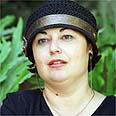
The revolution is already here
Are women approaching the scholarly women in their surroundings with halachic questions because it is more natural and less stressful to ask them? It doesn't really matter. What's important is that it's happening – here and now
It does not strike her as unusual when a neighbor knocks on the door and asks her a question about the meat spoon that the babysitter left on the counter next to a cup of coffee with milk, nor does she find it exceptional when the telephone rings and it is a rabbi who would like to consult with her about a halachic question he was asked. This is simply the reality in which she lives. Indeed, many women turn to her with questions that until recently they would have brought to their local rabbi. She has gotten used to it; I still have not.
In her professional life, Michal Tikochinsky, a mother of seven and a lawyer by training, heads the Moshe Green Beit Midrash for Women at Beit Morasha of Jerusalem, where she teaches Talmud along with male rabbis, and serves as an instructor in the Advanced Women's Halacha Program that started there several years ago. The program is designed for women who hold educational and public leadership positions, are highly motivated to engage in religious study, and are prepared to invest energy in the study of Halacha, in addition to their other endeavors.
Demanding diligence, perseverance, and a commitment to Halacha, the program was established to enable women who already have a rich background in Talmud study to round out their training by participating in a program of intensive and in depth study of Halacha. Its participants are primarily teachers in high schools and seminaries, who serve as a natural address for halachic questions from their students even without such specialist training.
As far as I know, this three-year program, which aims to build the next tier of Torah study for women, is unparalleled in the Jewish world. It devotes one year of study to the laws of forbidden and permitted foods (issur vaheter) and two years of study to the laws of Shabbat, and is very demanding, requiring its students not only to cover all of the material studied by men who are preparing for the ordination exams of the Israeli Chief Rabbinate, but also to study Shulchan Arukh (the Code of Jewish Law) at the accelerated rate of one section per week.
Thus, it seems that we will not have to wait too long until women serve as halachic adjudicators. It is becoming clear that the "200 Years" that Rabbi Haim Navon recently cited in Beit Morasha's Akdamot journal and in Ynet's Judaism site as the projected time it will take for women to attain this role are excessive. And this is even without mentioning the activities of the scholarly women in the Yoatzot Halacha program at the Nishmat Institute, headed by Rabbanit Chana Henkin, which trains women to serve as halachic advisors in matters of family purity. It is astonishing how accustomed we have become to a reality in which women are answering questions posed by other women with regard to such delicate issues.
What is surprising about the stories that Rabbanit Michal Tikochinsky tells me in passing is that they concern questions regarding everyday matters that are not delicate or sensitive like matters of ritual impurity. It is both surprising and encouraging that despite the pronounced availability of Rabbis who could serve as halachic decisors, neighbors and Beit Midrash students are choosing to approach a woman whom they regard as an authority, as a natural and straightforward step, without any concern that they may be doing something inappropriate.
Why are they doing that? Are women coming to the scholarly women in their midst because they see it as more convenient and natural, and less formal and stressful? It's hard to know. And truthfully, what does it matter? What's important is that it's happening – here and now.
Chayuta Deutsch is the editor of the Akdamot Journal, published by Beit Morasha of Jerusalem, and the author of Nechama: The Biography of Nechama Leibovitz, published by Yedioth Ahronot Press










